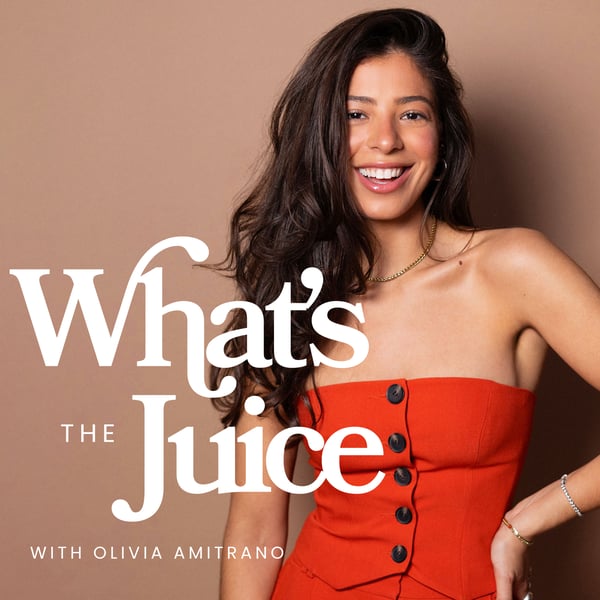S5E19 The Angry You Isn’t the Real You: How Hormone Imbalances Change Us | Dr. Corina Dunlap
What's The Juice
Olivia Amitrano
4.9 • 2.1K Ratings
🗓️ 24 June 2024
⏱️ 85 minutes
🧾️ Download transcript
Summary
What if you’ve never actually experienced your true personality? The truth is, when our hormones are out of whack, we’re totally different people. While there isn’t a one-size-fits-all solution, there are some key ways that we can all reduce inflammation and regulate our hormones, according to Dr. Corina Dunlap, a naturopathic women’s health and hormone specialist. In this episode, she gets juicy about the link between cortisol and ovulation (hint: we’re all too stressed out) and dives deep into the importance of relationships – with others, ourselves and mother nature.
HERE’S THE JUICE:
-
What does it feel like when we’re safe in our bodies? This is what balanced hormones feel like!
-
How inflammation can affect our mood, and make it hard to understand what our baseline or that “safe” feeling should feel like.
-
What the “goldilocks hormones” are – we don’t want too little or too much of them!
-
What the first line of action should be in addressing ovulation issues
-
Why unplugging your wifi at night could be the best trick to getting better sleep
-
How chronic stress doesn’t allow your body to feel safe enough to digest properly or ovulate
-
The best practices that you can adopt day-to-day to help with inflammation.
-
Clear questions you can ask yourself, like: is this me, or is this my hormones?
Connect with Dr. Corina Dunlap
Connect with Olivia:
Shop my full line of herbalist-formulated medicinal blends:
LINKS MENTIONED:
Transcript
Click on a timestamp to play from that location
| 0:00.0 | Welcome back to the pod family. I got a good one for you guys today about our |
| 0:09.0 | hormones and our mood and our sleep, but don't you worry it's not in the super hyper prescriptive way of |
| 0:18.8 | You just need to be doing X Y and Z better and you just need to be taking more of this, |
| 0:23.8 | and you just need to fix yourself because something is wrong. |
| 0:27.3 | It's not coming from that lens. |
| 0:29.1 | And as I say each week in these intros, |
| 0:31.6 | I'm really learning what lens may be the most helpful to you |
| 0:35.4 | guys and hopefully anyone else who discovers this podcast and I think that lens |
| 0:39.9 | is focusing not on doing more and doing better to quote fix our hormones and fix all these things that we're feeling, but actually learning how to be more, trading that constant need to do for this comfort in being and kind of shifting |
| 0:58.4 | our paradigm around how we're living and all of the things that we're doing to actually compensate just |
| 1:04.8 | straight up depletion and straight up disconnection from nature and what we might |
| 1:09.8 | really need as human beings who are so deeply part of the natural world. |
| 1:15.0 | You know, I think about it all the time. |
| 1:17.0 | Birds just know. |
| 1:18.0 | They just know when to start singing together and when to start chirping at sunrise and sunset and it's like they gather |
| 1:24.8 | every day at the same time. They don't need to be taught to do that. It's this instinctual thing because |
| 1:29.1 | they are nature. They are not a part of nature. they make up nature. And we do too. And it's so |
| 1:36.1 | interesting that as humans, I guess because we have such a massive |
| 1:39.8 | intelligence and this ability to invent and create things that are not necessarily of nature or as close to nature as a rock, right? |
| 1:48.0 | We've created really interesting abstract complex things, |
| 1:51.0 | and thus we've also put ourselves in this really complex abstract box. complex |
| 1:54.0 | and we've also put ourselves in this really complex abstract box where we are not connected with our own signals |
... |
Please login to see the full transcript.
Disclaimer: The podcast and artwork embedded on this page are from Olivia Amitrano, and are the property of its owner and not affiliated with or endorsed by Tapesearch.
Generated transcripts are the property of Olivia Amitrano and are distributed freely under the Fair Use doctrine. Transcripts generated by Tapesearch are not guaranteed to be accurate.
Copyright © Tapesearch 2025.

